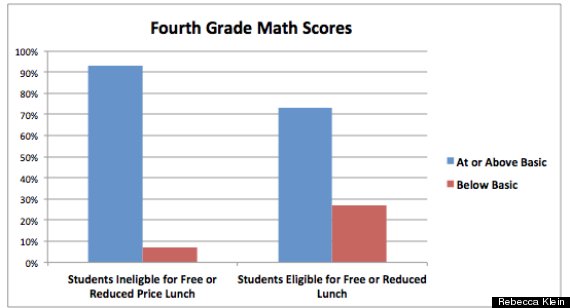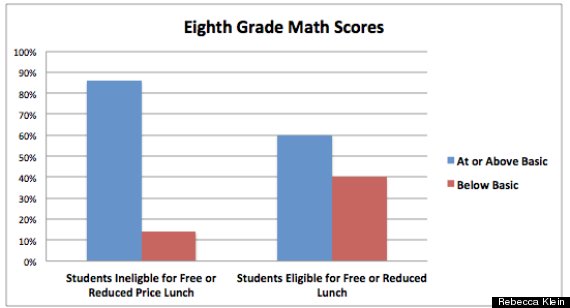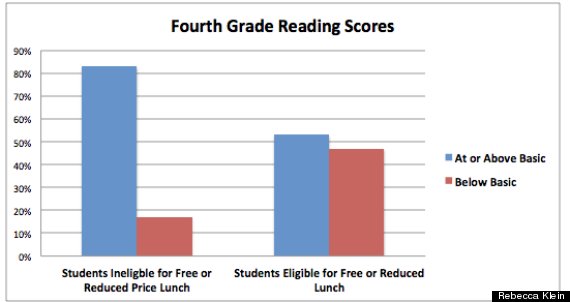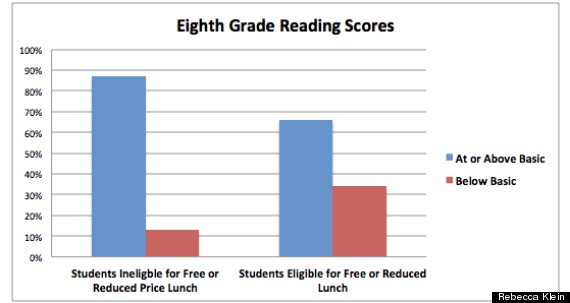Education
Related: About this forumHow Poverty Impacts Students' Test Scores, In 4 Graphs
http://www.huffingtonpost.com/2013/11/19/poverty-test-scores_n_4298345.html?utm_hp_ref=education&ir=EducationEarlier this month, results from the National Assessment of Educational Progress (NAEP) showed that while national test scores are slightly improving, most fourth- and eighth-graders around the country are not proficient in math and reading, and a sizable portion only have a basic understanding of the core subjects.
But how do these numbers look when you break them down based on social class?
Below we have created graphs comparing how the NAEP results looked for students who are eligible for free and reduced-price lunch based on their families’ income versus how they looked for students whose families’ are of a higher social strata.
The graphs unsurprisingly indicate that poverty is bad for learning, as students eligible for free and reduced lunch did significantly worse on the tests than their wealthier counterparts. Clearly, if we want to raise our nation’s test scores and reach a higher level of global competitiveness, lifting vulnerable learners out of poverty would be one way of doing so.




Tansy_Gold
(18,054 posts)But will do it anyway.
Not that those who need to have it shoved in their faces will ever see it. ![]()
Starry Messenger
(32,375 posts)But posting this stuff is one of my avenues of resistance. Hopefully each pebble builds the pile a little higher.
Tansy_Gold
(18,054 posts)How much more obvious could any of this be? Do we really need graphs to show us? More studies? More surveys? More comparison of test scores?
yeah, yeah, I know, preachin' to the choir.
I was thinkin' about this other day, too, while listening to the reporting on Trey Radel's cocaine bust. Too many people -- including Maddow and Hayes and O'Donnell, I fear -- don't truly understand the fundamental difference between the democratic/liberal/progressive/socialist ideology and the republican/conservative/fascist ideology. The latter is based on inequality. Inequality of wealth, of resources, of opportunities. The right sees no problem in and feels no shame about the data in those graphs. The double standard of morality applies, too. "The rich are different" also means they get treated differently and aren't held to the same standards of behavior. The right wing cannot exist without inequality; they have to protect, promote, sustain and aggravate it.
IF -- and that's a huge IF -- IF the so-called liberal media really wanted to effect change, they'd pound that concept home day after day after night after night. The only one who did it with any regularity was Keith Olbermann (who had so many problems that overshadowed his effectiveness) because he often had John Dean on his show. And John Dean, who worked with Robert Altemeyer, recognized the fundamental difference in the two philosophies.
Sorry I spouted off. I'll go crawl back in my little hole now. ![]()
Starry Messenger
(32,375 posts)It's always a pleasure to see you Tansy_Gold!
Hayes used to write more about class, he was an editor for In These Times. I'm sad because I thought his show would focus more on the labor and class issues he's covered in the past.
It seems to be difficult to get any examination of class issues in education in the mainstream media. I keep hoping someone like Michael Moore will take it on.
Igel
(36,087 posts)Which is just another way of saying that it serves an end.
We keep hearing about solutions. The meal program was a big part of the solution. Except it wasn't. It did serve the goal, however. The goal was worthy--it's just not the goal that was needed to sell the program.
EC program were a big part of the solution. Except that while they have a significant effect on things like high school graduation and college attendance, they have a trivial effect on high school graduation and colelge attendance. "Significant" doesn't mean "important." Yet the EC programs served the desired goal, however. It wasn't an unworthy goal--just not the goal that was the selling point of the program.
This is round three. And again we keep hearing about significant effects in the research journals, where "significant" =/= "important". But as soon as it's in the newspaper, we see "significant" = "important". Worthsmiths have trouble wrapping their heads around polysemy when it suits them. Again, it's not an unworthy goal that people have in mind, but they are using kids to sell a social program. Twice is enough.
In fact, this time around it's going to bite people in the butt. So one study was widely touted as showing that kids in poverty (which immediately became "low income"![]() had irreversible changes to part of their pre-frontal cortex and amygdala, specifically the executive function portion of the PFC. Meaning that over time the lack of executive control would lead to lower academic success and, at age 24, reduced control over their emotions and actions. This immediately means that somehow the effects have to be remedied, right?
had irreversible changes to part of their pre-frontal cortex and amygdala, specifically the executive function portion of the PFC. Meaning that over time the lack of executive control would lead to lower academic success and, at age 24, reduced control over their emotions and actions. This immediately means that somehow the effects have to be remedied, right?
Now, while interesting in and of itself, if reproducible, it also means that those who grew up in poverty are at that point intrinsically at a disadvantage because lack of control over actions and emotions at university and in the workplace will be a disadvantage because those are things that are very, very difficult to "level". Fortunately, again "significant" =/= "important".
The main problem I have with this kind of study is that causation stops where it's convenient. People are poor because they're poor or non-white. There's no logic in being poor, it's just accident or imposed from without because as we all know prosperity is the natural state of man. Even Rousseau couldn't hold that particular line.
Starry Messenger
(32,375 posts)There is a reason people are poor, and it can be remedied. The fact that higher SES students do better on the tests means that poverty remediation aka jobs programs and expanding the social safety net are worthwhile objectives to improve learning outcomes.
I'm into remedying the causes and preventing the effects.
snot
(10,705 posts)warrant46
(2,205 posts)ie: if you are poor ----you will continue to be in the present system